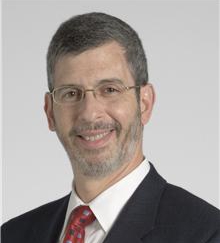Michael Lincoff (B.S. 1982), Prominent Physician and Engineer for a Healthy Heart
Dr. Michael Lincoff was one of the speakers at BME's 10th anniversary panel discussion held in Spring 2013. BME Department has since worked with him to convert his insightful speech, where he shared his career experience and vision on biomedical engineering, into the following profile.
The Cleveland Clinic is one of the largest hospital systems in the world, and it has the #1 ranked program in the U.S. for cardiovascular diseases. The Vice Chair of its Department of Cardiovascular Medicine, who also serves as the Director of Cleveland Clinic Coordinating Center for Clinical Research to manage its multicenter clinical trials, is Dr. Michael Lincoff (B.S. '82).
A CIT Student Aspired to Engineer a Better Human Body
When Dr. Lincoff came to CMU in 1978, he aspired to become a physician. However unlike most premed students, he was not excited by the conventional path to medical school by majoring in biology or chemistry. Instead, he chose to major in Chemical Engineering and Biomedical Engineering. He recalls that as a 12-year old science geek he was already inspired by the newly published novel “Cyborg“ by Martin Caiden, in which an injured test pilot was reconstructed with bionic limbs. The concept of “biomedical engineering”, through which one could repair, replace, and improve damaged or dysfunctional parts of the human body, became remarkably compelling to him.
Thus, Dr. Lincoff realized that he would derive the most satisfaction not to become a conventional engineer, but to instead apply engineering training to directly treat human beings, to intervene and reverse the course of life-threatening diseases. He was particularly fascinated by the possibility of an artificial heart, which seemed to be an imminent possibility even at the time. His early identification of heart as target organ was quite different from the practice of most medical students, who would choose a specialty only during clinical rotations or during the residency. He started conducting research in artificial organs as an undergraduate student with Dr. Harvey Borovetz, a biomedical engineer (and former chair of Bioengineering) at the University of Pittsburgh, who is also an alumnus of CMU Biomedical Engineering (Ph.D. ’76).
Transition from an Engineering Student to a Preeminent Cardiologist
After graduating from CMU in 1982, Dr. Lincoff attended Johns Hopkins Medical School. He then completed a residency in internal medicine at Beth Israel Hospital in Boston, followed by a fellowship in cardiovascular diseases at the University of Michigan Medical Center and another fellowship in interventional cardiology at the Cleveland Clinic. His current clinical specialty of interventional cardiology involves the use of catheter-based techniques to treat cardiovascular disease. In addition to treating patients, his research interests have over the past 20 years evolved from the laboratory to human subjects research, focusing on the development of therapies to reduce acute and long-term complications of percutaneous coronary revascularization procedures, to optimize therapy for acute coronary ischemic syndromes, and to reduce progression or complications of atherosclerosis. He also supervises all human subjects research throughout the Cleveland Clinic Health System. Outside the Cleveland Clinic, he chairs the Cardiac and Renal Drugs Advisory Committee of the US Food and Drug Administration, which leads the nation in evaluating the scientific evidence for regulatory drug approval.
Leveraging Engineering Education for Pioneering Medicine
Dr. Lincoff attributes much of his success to his engineering education at CIT. Although his medical career does not involve differential equations or heat/mass exchange, what he learned at CMU nevertheless played a major role—the abilities to think critically, to challenge dogmas, to analyze problems quantitatively, to apply the knowledge for practical problem solving, to engage in teamwork, and to drive himself for perpetual improvements. During medical school, Dr. Lincoff was dismayed by the limited goal (at the time) for students to simply amass and memorize large volumes of information, learn manual skills and acquire the defined thought processes to carry out the “art” of medicine, and develop facility in interaction with and care of patients. Medical school training emphasized managing the body of medical knowledge, which was in stark contrast to the emphasis on expanding the knowledge as he learned as an engineering major.
Delivering Medical Benefit for the Society Based on Engineering Thinking
Dr. Lincoff believes that working in the field of biomedical engineering carries a societal responsibility distinct from that of other engineering specialties. While traditional engineering no doubt benefits the society, the access to healthcare and to effective drugs and devices is now recognized as nearly a fundamental right which is most seriously threatened by the intersection of technological progress and unmanageable costs. The biomedical engineering industry and the medical community must share the societal responsibility to see beyond profit, and to critically evaluate technologic advances against the real clinical benefit and the limited resources. Despite many biomedical engineering products that have provided unequivocal benefits to patients—for example pacemakers, defibrillators, cardiac ultrasound, and drug-coated arterial stents for cardiology—there are also inventions that may seem plausible but have increased the cost of medical care without real benefits or may even cause harm—devices to shave atherosclerotic plaque, routine screening with CT scanners, or some drugs to lower blood sugar or cholesterol. Making such assessment is by no means straightforward. While it is hubris to believe that engineering theories, equations, and simulations will be able to account for the complexities of human biology, the essence of engineering thinking and problem solving proves to be critically important to evidence-based medicine for translating technologies to the true medical benefit for the human society.
